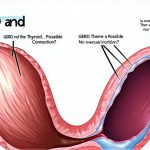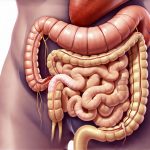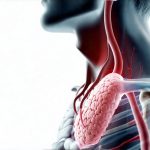The digestive system is often viewed as separate from other bodily systems, but in reality, it’s intricately connected with hormone regulation, nutrient absorption, and overall health. One crucial hormonal connection that frequently goes unnoticed is the relationship between thyroid function and digestion. A healthy thyroid is essential for maintaining a proper metabolic rate, which directly impacts how efficiently our bodies process food and absorb nutrients. When thyroid function falters—whether it’s an underactive (hypothyroidism) or overactive (hyperthyroidism) state—digestive processes can become significantly disrupted, leading to a wide range of uncomfortable symptoms and potential long-term health concerns.
Understanding this connection isn’t about self-diagnosing; it’s about recognizing the potential interplay between these systems. Many common digestive complaints may have roots in thyroid imbalances, and addressing thyroid health can often improve or alleviate digestive issues. This article will explore the ways in which thyroid hormones influence digestion and vice versa, providing insight into this complex relationship and highlighting areas to discuss with a healthcare professional.
The Thyroid’s Role in Digestive Processes
The thyroid gland produces hormones – primarily thyroxine (T4) and triiodothyronine (T3) – that regulate metabolism. Metabolism isn’t just about weight; it encompasses all chemical processes within the body, including those vital for digestion. A properly functioning thyroid ensures adequate production of digestive enzymes and maintains the necessary motility of the gastrointestinal tract to move food efficiently through the system.
Essentially, thyroid hormones act as a ‘gas pedal’ for many bodily functions, including digestion. When this ‘gas pedal’ is malfunctioning – too slow in hypothyroidism or too fast in hyperthyroidism – digestive processes can be thrown off balance, impacting everything from stomach emptying to nutrient absorption and bowel regularity.
How Thyroid Imbalance Affects Digestion
Thyroid imbalances can manifest very differently in terms of digestive symptoms depending on whether the thyroid is underactive or overactive. Hypothyroidism commonly leads to slowed digestion, while hyperthyroidism typically speeds it up. These altered rates significantly impact how food is processed and absorbed by the body.
Hypothyroidism and Digestive Issues
Hypothyroidism, characterized by insufficient thyroid hormone production, often results in constipation. This occurs because reduced metabolic rate slows down the contractions of intestinal muscles (peristalsis), making it difficult for waste to move through the digestive tract. Beyond constipation, hypothyroidism can also cause bloating, abdominal pain, and a feeling of fullness even after eating small amounts of food due to delayed gastric emptying – the time it takes for food to leave the stomach. Reduced acid production in the stomach is another common consequence, potentially leading to impaired protein digestion and nutrient absorption.
Furthermore, long-term hypothyroidism can impact intestinal permeability, sometimes referred to as ‘leaky gut’. This means the lining of the intestines becomes more porous, allowing undigested food particles and toxins to enter the bloodstream, which may trigger inflammation and exacerbate digestive symptoms. It’s important to note that these effects often develop gradually, making it difficult to immediately recognize a link between thyroid function and digestive distress.
Hyperthyroidism and Digestive Issues
In contrast to hypothyroidism, hyperthyroidism speeds up metabolic processes. This acceleration can lead to diarrhea or frequent bowel movements as food moves through the digestive tract too quickly, reducing the time available for nutrient absorption. Some individuals with hyperthyroidism may also experience abdominal cramping and urgency. Increased gastric motility can sometimes cause nausea or even vomiting.
While less common than constipation in hypothyroidism, malabsorption of nutrients can still occur in hyperthyroidism because of the rapid transit time. This is particularly true for fat-soluble vitamins (A, D, E, K) which require a longer exposure to the intestinal lining for proper absorption. The increased metabolic demands associated with hyperthyroidism can also contribute to weight loss despite normal or even increased appetite.
Nutrient Absorption and Thyroid Function
Regardless of whether thyroid function is too high or too low, both states can impact nutrient absorption. As mentioned earlier, hypothyroidism can reduce stomach acid production, hindering the absorption of essential nutrients like vitamin B12, iron, and calcium. Similarly, hyperthyroidism’s rapid intestinal transit time may not allow sufficient contact between nutrients and the absorptive surfaces of the intestines.
Deficiencies in certain nutrients – such as selenium, zinc, iodine, and tyrosine – are also crucial for thyroid hormone production itself. A vicious cycle can develop where a nutrient deficiency impairs thyroid function which then further hinders nutrient absorption, leading to more deficiencies. This complex interplay highlights the importance of addressing both thyroid health and nutritional status simultaneously.
Ultimately, recognizing the connection between thyroid function and digestion is about understanding the body as an interconnected system. While digestive symptoms are often treated in isolation, exploring potential underlying thyroid imbalances can offer a more holistic approach to long-term wellbeing. It’s vital to consult with healthcare professionals for proper diagnosis and personalized treatment plans. They can assess thyroid function through blood tests and evaluate digestive health to determine the best course of action.


















